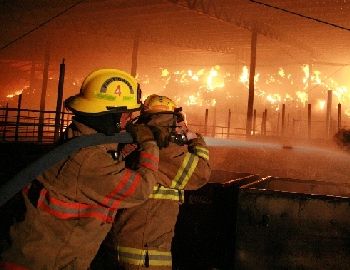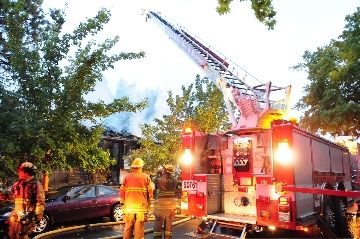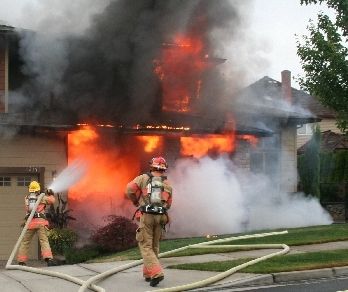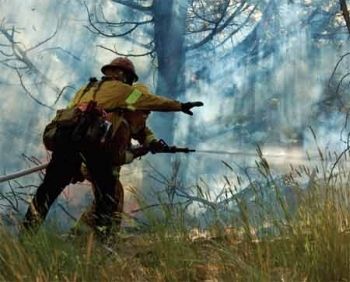
Publisher:
Bonnie King
CONTACT:
Newsroom@Salem-news.com
Advertising:
Adsales@Salem-news.com

~Truth~
~Justice~
~Peace~
TJP
Nov-14-2009 14:12

 TweetFollow @OregonNews
TweetFollow @OregonNews
Opinion: Fight Fire with Fire
Ersun Warnke Salem-News.com Business/Economy ReporterIn order to protect ourselves from the threat of future fires, we must become a society of fire fighters.
 Photo by Dennis Weis |
(EUGENE, Ore.) - The fireman is a bold and noble figure in our society. He embodies the virtues of bravery, sacrifice, and duty toward others. The fireman is technically proficient.
He skillfully executes his duties using both mind and body, and relying on a set of tools that he has mastered in order to perform his task.
As a society, we admire the fireman, and rely on his services to protect and maintain our society. However, despite our admiration for the fireman, he has been forgotten by society. I am calling for people to remember the fireman, and I believe that in this remembrance lies the seeds of a rebirth for not only the noble profession of firefighting, but for our society as a whole.
Firefighters are under-funded, under-trained, and under-equipped. More importantly, there are not enough firefighters to truly provide security against fire for our society. This is an issue that should be of pressing concern to all people of elevated position.
Those people who are the opinion makers and leaders in society cannot fall into the complacence that grips the common man. If a man's house has never caught fire, he assumes that fire cannot touch him, and sees no need to save his money away for the day that it might.
It is the duty of those responsible men in society, who take it upon themselves to care for the negligent commoner, to insure that such men are forced to take those measures which are in the end for their own good and for the good of all.
Consequently, we have fire insurance, which is required for most homes, and we have Fire Departments paid for and maintained by public purse. Such measures have provided adequate protection against fire for a time, but the insufficiency of these measures in light of current conditions becomes increasingly apparent as time passes.

Fire fighting has become so effective that the common man no longer fears fire at all. With improvements in building codes, the rapid spread of fires in cities is no longer a constant threat.
Current fire fighting technology is so proficient in meeting current fire threats that a decided disinterest in developing technology to fight future fires has developed. The threat of fire always exists, and there is certainly a need to develop fire fighting technology to the greatest extent possible.
Unfortunately, the complacent common man, ignorant of the dangers around him, will not recognize these threats until they are before his face, when it is already too late.
It is thus the responsibility of the leaders, the thinkers, and the doers of society to take action to wake the common man from his slumber.
If we are to build the fire fighting capacity that is needed to face all potential future fire threats, which is the only responsible option, then the number of fire fighters must be increased, the technology they are equipped with must be improved, their training must be improved, and they must gain the recognition and support of the entire society.

Fire fighting is an expensive undertaking, and only with broad social support can the necessary funds to fully equip a proper fire fighting force be raised.
The best way to increase funding for fire fighting is to privatize fire departments and open them up to market forces. Eliminate fire fighting monopolies, and allow several fire departments to compete in the same city. These fire fighters can still be funded by tax revenue, but they could also be funded by additional private fees.
The more valuable a building is, the greater the willingness of its owner would be to pay for fire protection. By allocating fire fighting resources according to the value of property, funding for fire fighting can be increased. Insurance companies, run by individuals with proper foresight, would be happy to pay for increased protection from fire, and pass these costs to their customers, who may lack the ability to see the necessity of such expenses.
Aside from the functional benefits of privatization, it must also be noted that the pecuniary interests of businessmen are a powerful force in and of themselves. While the businessman may be no different in intellect from the commoner, his single minded pursuit of money insures that he can be made to perform whatever tasks are assigned to him to the utmost of his ability.
The businessman's creativity in the pursuit of money, when unleashed and properly focused on the correct objectives, can result in unexpected and unpredictable means of achieving those objectives.
The most obvious avenue by which the businessman may avail himself of increased profits in the fire fighting business is by an increase in the number of fires to be fought. The greater the risk of fire, the more property owners will be willing to pay for fire fighting services. The greater the number of fires, the more fire fighters will be needed. These additional fire fighters will need to be equipped and additional investments will need to be made in training fire fighters.

All of this increased fire fighting activity, if done in the private sector instead of the public sector, must be funded by debts. Consequently, the gambling businessman, who takes on debt recklessly with little regard to how it will be paid, will continually find himself in progressively increasing levels of debt, and with progressively increasing incentives to increase the scale of his fire fighting activities. Businesses based on debt can never get out of debt.
They must grow sufficiently to take out new loans which can be used to pay the old, but the debt is only increased, never decreased. If fire fighting is privatized and given over to businessmen to operate, permanently increasing investment is guaranteed in perpetuity.
At this juncture, some may object that this proposal would entail a dramatic increase in the number of fires taking place on a daily basis. This is a necessary cost of increased security from fire for our society. It is essential to remember that this program is proposed to address a lack of preparedness for future fire threats.
These threats are far more ominous that a few mundane daily fires. If the cost of preparing for grave future fire threats is to face a few smaller fires on a daily basis, then the rational man must choose to willingly accept a few daily fires.
If fires are determined not at random, but according to market forces, these fires will likely prove to be less threatening. A random fire may strike anywhere at any time. A fire determined by market forces will likely be limited by the constraints of profitability, which should consequently limit the damage caused.
There will always be some risk associated with fires, and men & women in the fire fighting business will have to exercise a degree of caution in choosing which fires to fight. There will likely be strong efforts to protect individuals from harm, at least those individuals of a certain strata and importance to society.
It should also be remembered that we have a great stock of unused housing units and commercial properties in this country. An increase in fire fighting could be a powerful stimulus to the economy on many levels. The elimination of unused housing units and commercial properties would put fresh money into the hands of property owners. This money would be used to increase investment. New construction would be required. All of this economic activity would have powerful secondary effects in the economy.
Fire fighters are held in high esteem by society for good reason. Having been forgotten by society, society must be reminded of why fire fighters are so important. This is a job for the responsible classes of society to whom all of the decisions for the common good must fall. In order to protect ourselves from the threat of future fires, we must become a society of fire fighters. The common man cannot perceive the necessity of this course. In order to wake him from his slumber we must fight fire with fire.
===================================
 Salem-News.com Business/Economy Reporter Ersun Warncke is a native Oregonian. He has a degree in Economics from Portland State University and studied Law at University of Oregon. At a young age, his career spans a wide variety of fields, from fast food, to union labor, to computer programming. He has published works concerning economics, business, government, and media on blogs for several years. He currently works as an independent software designer specializing in web based applications, open source software, and peer-to-peer (P2P) applications.
Salem-News.com Business/Economy Reporter Ersun Warncke is a native Oregonian. He has a degree in Economics from Portland State University and studied Law at University of Oregon. At a young age, his career spans a wide variety of fields, from fast food, to union labor, to computer programming. He has published works concerning economics, business, government, and media on blogs for several years. He currently works as an independent software designer specializing in web based applications, open source software, and peer-to-peer (P2P) applications.
Ersun describes his writing as being "in the language of the boardroom from the perspective of the shop floor." He adds that "he has no education in journalism other than reading Hunter S. Thompson." But along with life comes the real experience that indeed creates quality writers. Right now, every detail that can help the general public get ahead in life financially, is of paramount importance.
You can write to Ersun at: warncke@comcast.net
Articles for November 13, 2009 | Articles for November 14, 2009 | Articles for November 15, 2009

Salem-News.com:

Quick Links
DINING
Willamette UniversityGoudy Commons Cafe
Dine on the Queen
Willamette Queen Sternwheeler
MUST SEE SALEM
Oregon Capitol ToursCapitol History Gateway
Willamette River Ride
Willamette Queen Sternwheeler
Historic Home Tours:
Deepwood Museum
The Bush House
Gaiety Hollow Garden
AUCTIONS - APPRAISALS
Auction Masters & AppraisalsCONSTRUCTION SERVICES
Roofing and ContractingSheridan, Ore.
ONLINE SHOPPING
Special Occasion DressesAdvertise with Salem-News
Contact:AdSales@Salem-News.com


Terms of Service | Privacy Policy
All comments and messages are approved by people and self promotional links or unacceptable comments are denied.
Scratching my head.. November 17, 2009 1:05 pm (Pacific time)
I had to read this article twice to let it sink in. I can't tell whether the author truly believes this theory, or is simply using this vehicle to prompt discussion. Either way, here's MHO. Private fire protection is not the answer. Places that utilize it often experience a lesser level of care, with under-paid firefighters who leave to go to a public department after a short time. These private departments are influenced by their profit margin, and not necessarily the safety of the public (which might make them good arsonists, as mentioned by Oregon Reader). The fire protection industry continues to advance it's technologies and research, despite the author's un-justified perceptions. In fact, if you look at fire protection in other parts of the world (Europe for example) fire prevention has greater focus and produces greater results than simply increasing the number of firefighters. And lets not forget the primary source of calls for every FD in the country, medical emergencies. To carry the author's theory into this realm, only the well funded properties would have a timely medical response. Is this truly the most efficient system? That is why I believe fire protection (as well as medical and police) should remain in the public sector. When your motivation becomes money (greed) you are no longer serving in the public interest, which is why they call it public safety in the first place.
Oregon Reader November 15, 2009 5:44 am (Pacific time)
Good analogy. What happens when the firefighter become the arsonist. Or when the maker of firefighting equipment decides to increase demand for his wares by reducing the efficiency of his products. What about the firefighting schools that no longer teach the best techniques and then, only to the second-rate students? Or when the insurance company under-insures with monopoly rates? Or the insurance industry that makes a concerted effort to insure those that are careless with fire? What these are alluding to is the underlying causes of the contemporaneous economic calamity. Too little in the way of insurance regulation to protect the industry from fires spread due to the speculative transfer of smoldering embers among people not trained to deal with the heat and to those who never understood the fact that they were holding incendiary devices.
stephen November 14, 2009 4:31 pm (Pacific time)
They should do same with our educational system...But that is not the plan Ersun. The plan is complete government control, over everything. IMF bank = world control over our money, using the cap and trade scam to finance it. WHO = take over the medical and pharmaceutical system which promotes medicine to make money, not cures. The industrial military complex to keep the wars and hatred going.. That would be NATO. The agricultural industrial complex, which is monsanto, who obama just made in charge of food. Need I go on? EXCELLENT article, and proud of you, but the picture is bigger. I do really enjoy your articles tho Ersun, I look forward to them. Great work. This is the kind of editorial work that will plant seeds in those who know there is a better way, than the NWO government takeover. But you do it in a way, that does not make you seem like a crazy man bringing up the NWO, like I do. Good job, I am learning from your approach.
[Return to Top]©2025 Salem-News.com. All opinions expressed in this article are those of the author and do not necessarily reflect those of Salem-News.com.